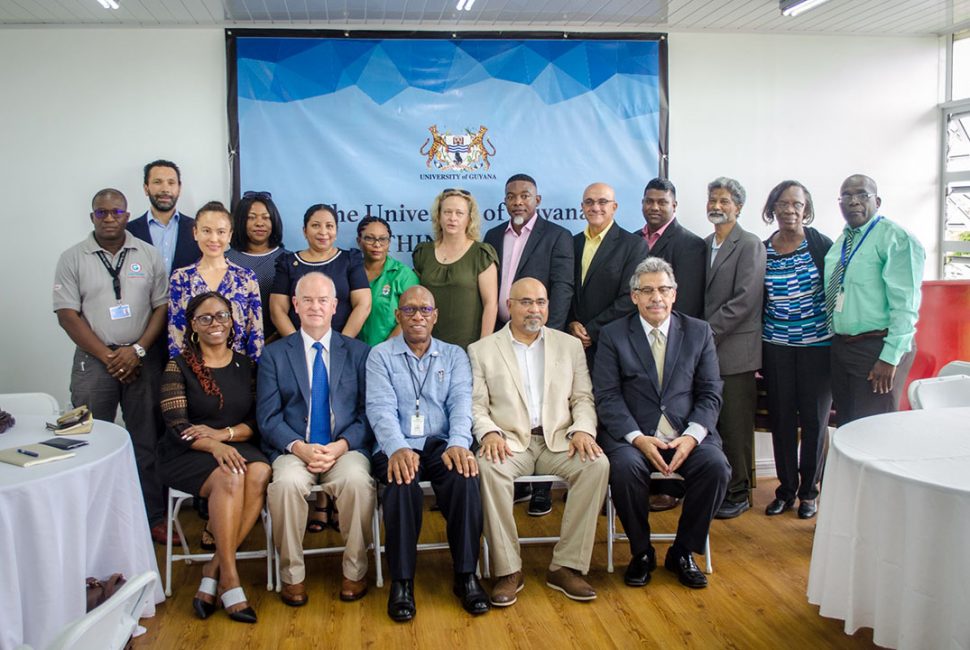The University of Guyana (UG) on Friday launched its Energy Think Tank, which is part of efforts to better equip the institution’s oil and gas programme with an agenda that caters to Guyana’s plan to produce fossil fuels while pursuing sustainable development.
Speaking at the launch of the Think Tank, Dr Paloma Mohamed-Martin, Director of Philanthropy, Alumni and Civic Engagement (PACE) at UG, explained that the initiative was built on the sporadic and un-coordinated work of several colleagues at the university.
This work will now form the nucleus of “an energy agenda which is in urgent need of being developed,” Mohamed-Martin explained.
She stressed that as Guyana moves into this uncharted territory, it faces many pressures, including the possible impact of immigration and climate change.
“The university, with the help of friends around the world and in Guyana, has been trying to figure out the nuts and bolts of Guyana’s green vision for itself and how it’s going to work…it is a really exciting opportunity to do academic work on the problem and to figure it out, [so] over the last year we have been working to figure out best way to do this,” she noted.
Dr Suresh Narine, who delivered the feature address at the launch, reminded that action without strategy is a nightmare and strategy without action is simply a daydream.
According to Narine, energy has played a pivotal role in the ascendency of countries, geopolitics and the ascendency of cultures.
He stressed that the “developed” countries that have determined the world agenda have without fail been those countries which produce energy and stressed that the newly developing oil and gas sector provides Guyana with an opportunity not just to cut its rather high energy bill, but to generate “home grown” capital, which can be used for development in lieu of foreign direct investment.
Narine, along with representatives from the Trent University, CbMEX, Arizona State University, the Guyana Energy Agency, the Department of Energy, the Department of Environment, Guyoil, the Faculty of Engineering and Technology, the Faculty of Natural Sciences and the Faculty of Social Sciences of UG worked to clarify, propose and support a research agenda on energy for UG.
Over the period of its existence, the group will also work to propose and support a teaching and training agenda on energy for UG to support the medium to long-term national agenda.
The members of the Think Tank are: Patrick Ketwaroo, Department of Chemistry, Faculty of Natural Sciences, UG; Dr. Devon Gardner, Programme Manager, CARICOM Energy Programme; Dr. Mahender Sharma, Chief Executive Officer (CEO), Guyana Energy Agency; Dr. Mark Bynoe, CEO Department of Energy, Ministry of the Presidency; Prof Gary Dirks, Director of the Ann Wrigley Global Institute of Sustainability and Director of LightWorks®, a solar energy and light-inspired research Institute at Arizona State University; Prof. Sayfe Kiaei, a Professor in the School of Electrical, Energy and Computer Engineering, the Director of the Connection One Center (NSF I/UCRC Center) and Motorola Chair in analog and electrical systems; Prof. Jose Pablo Rinkenbach, Prof. of Corporate Finance and Energy Investment at ITAM in Mexico; Vishal Persaud, Head of the Department of Mechanical Engineering, Faculty of Engineering and Technology, UG; Verlyn Klass, Department of Electrical Engineering, Faculty of Engineering and Technology, UG; Elena Trim, Dean of the Faculty of Engineering and Technology UG; Prof. Suresh Narine, Professor and Director, Trent Centre for Biomaterials Research and Canada and NSERC Industrial Research Chair in Biomaterials; Dr. Lawrence Lewis, Faculty of Agriculture, UG; Prof Michael Scott, acting Vice Chancellor, UG; and Paloma Mohamed-Martin, Deputy Vice Chancellor (PACE), UG.






